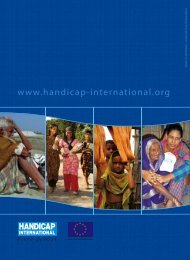Full page photo print - Harvard Law School Project on Disability
Full page photo print - Harvard Law School Project on Disability
Full page photo print - Harvard Law School Project on Disability
You also want an ePaper? Increase the reach of your titles
YUMPU automatically turns print PDFs into web optimized ePapers that Google loves.
3. Report:<br />
Ask each group to present its “biography.”<br />
4. Analyze/discuss<br />
Discuss with the group what it would take for each of these ficti<strong>on</strong>al people to achieve the right<br />
to work.<br />
• C<strong>on</strong>sider the various supports and accommodati<strong>on</strong>s referenced in Article 27.<br />
• What could be d<strong>on</strong>e to obtain these supports and accommodati<strong>on</strong>s?<br />
WHAT DOES HUMAN RIGHTS LAW SAY ABOUT THE RIGHT TO WORK?<br />
The right to work is addressed in a variety of human rights law instruments. For example, the<br />
Universal declarati<strong>on</strong> of human Rights (UDHR) discusses the right to work in Article 23,<br />
addressing such issues as freedom of choice in employment, fair pay, equal pay for equal<br />
work, and the right to form and join trade uni<strong>on</strong>s. The internati<strong>on</strong>al covenant <strong>on</strong> civil and<br />
Political Rights (ICCPR) also c<strong>on</strong>tains provisi<strong>on</strong>s relevant to the right to work in Article 8,<br />
which focuses <strong>on</strong> the right of every<strong>on</strong>e not to be held in slavery or servitude, as well as to be<br />
free from forced or compulsory labor except in certain limited circumstances.<br />
The internati<strong>on</strong>al covenant <strong>on</strong> ec<strong>on</strong>omic, social and cultural Rights (ICESCR)<br />
elaborates further <strong>on</strong> the right to work, with three articles addressing related issues, including:<br />
• Article 6 – affirming the right to work and calling <strong>on</strong> governments to achieve its<br />
realizati<strong>on</strong> through polices and practices that safeguard “fundamental political and<br />
ec<strong>on</strong>omic freedoms to the individual”;<br />
• Article 7 – addressing the right of every<strong>on</strong>e to “just and favourable c<strong>on</strong>diti<strong>on</strong>s of<br />
work,” including safe and healthy working c<strong>on</strong>diti<strong>on</strong>s, fair wages, equal opportunity for<br />
promoti<strong>on</strong> subject to seniority and competence, and rest and leisure time;<br />
• Article 8 – addressing the right of every<strong>on</strong>e to form and join trade uni<strong>on</strong>s, and the<br />
rights of trade uni<strong>on</strong>s to functi<strong>on</strong> freely subject <strong>on</strong>ly to those restricti<strong>on</strong>s necessary<br />
in a democratic society to preserve public order or protect the rights and freedoms of<br />
others. 2<br />
General Comment No. 5 of the committee <strong>on</strong> ec<strong>on</strong>omic, social and cultural Rights (the<br />
treaty body resp<strong>on</strong>sible for m<strong>on</strong>itoring implementati<strong>on</strong> of the ICESCR) addresses some of the<br />
barriers faced by people with disabilities in fully enjoying the right to work under the ICESCR,<br />
such as the pervasiveness of disability-based discriminati<strong>on</strong> in the employment field, the<br />
limited and often substandard employment opti<strong>on</strong>s available to people with disabilities, and<br />
the barriers to work resulting from lack of enjoyment of other human rights, such as access<br />
to transportati<strong>on</strong> to get to work. It also notes the need for governments to ensure that people<br />
with disabilities can fully enjoy their trade uni<strong>on</strong>-related rights, and to regularly c<strong>on</strong>sult with<br />
organizati<strong>on</strong>s of pers<strong>on</strong>s with disabilities <strong>on</strong> employment and other matters. 3<br />
Article 32 of the c<strong>on</strong>venti<strong>on</strong> <strong>on</strong> the Rights of the child (CRC) recognizes the right of all<br />
children to be free from ec<strong>on</strong>omic exploitati<strong>on</strong> and any work that might interfere with their<br />
educati<strong>on</strong>, or that would be harmful to their “health or physical, mental, spiritual, moral or social<br />
development.” In additi<strong>on</strong>, it requires States to establish a minimum age (or minimum ages)<br />
for employment, to regulate the hours and c<strong>on</strong>diti<strong>on</strong>s of employment, and to ensure the use of<br />
penalties or other sancti<strong>on</strong>s in order to enforce Article 32. 4<br />
2 See http://www.unhchr.ch/html/menu3/b/a_cescr.htm<br />
3 See http://www.unhchr.ch/tbs/doc.nsf/(symbol)/E.C.12.2000.4.En<br />
4 See http://www.unhchr.ch/html/menu3/b/k2crc.htm<br />
PART 2: The c<strong>on</strong>venTi<strong>on</strong> <strong>on</strong> The RighTs of PeRs<strong>on</strong>s wiTh disAbiliTies<br />
143




